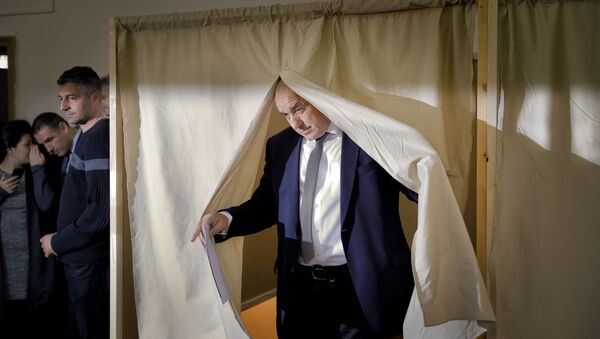According to preliminary results from Bulgaria's electoral commission tabulated Monday morning, GERB, led by ex-prime minister Boyko Borisov, won Sunday's snap election with a plurality of 32.58% of the vote. The Bulgarian Socialist Party (BSP), led by Korneliya Ninova, came in second with 27.02%. The United Patriots, a coalition of nationalist forces, won 9.1%. The pro-ethnic Turkish Movement for Rights and Freedoms (DPS) came in fourth, with 8.9%. The populist Volya ('Will') party was the only other party to squeak through the 4% threshold, with 4.1%.
Experts are almost unanimous in saying that forming a coalition government from these results will prove challenging. GERB has ruled out a coalition with the Socialists under any circumstances.
Petr Iskenderov, a senior fellow at the Institute for Slavic Studies at the Russian Academy of Sciences, says that the figures clearly show that GERB will be hard pressed to form any kind of coalition. Furthermore, any coalition that is created will be likely to prove fragile and unworkable, he said, meaning new elections may be just around the corner.
GERB, Iskenderov said, will now have to choose between the United Patriots and the pro-Turkish DPS. The second option is more realistic, according to the observer, but Borisov will also have to consider the poor state of relations between Brussels and Ankara.
"In both cases, it's obvious that the coalition will be fragile; its existence will depend on a number of geopolitical factors," the academic suggested. "The most realistic scenario is that we will see complex negotiations and, ultimately, the holding of new early elections, because even if a coalition is formed, it will factually prove to be unworkable," Iskenderov added.
Furthermore, he suggested, it will be necessary to take into account the significant differences between Borisov and President Radev, who in his political positions is much closer to the Socialists. The BSP nominated Radev as their candidate for November's presidential election.
What Should Moscow Expect From Sofia?
According to Iskenderov, the future of relations between Russia and Bulgaria will also depend heavily on the strength or weakness of the coalition. If it is fragile, Russia will factually fall to the wayside anyway, as Borisov addresses more pressing issues related to ensuring his own political survival.
Ultimately, Iskenderov suggested that Borisov is likely to promote an anti-Russian course, in line with directives from Brussels. However, the EU itself will also be preoccupied with its own problems over the next six months, including the UK's exit from the bloc, the union's broader restructuring, and elections in France and Germany.
"It's obvious that the Russian dossier in the EU's activities will become a background issue until the end of the year, discussed mainly on the national level, and in the framework of election campaigns," the expert noted. "So it's not worth expecting any changes in the EU's relationship with Russia, for better or for worse. Accordingly, relations between Russia and Bulgaria will remain in a semi-frozen state," Iskenderov concluded.
Bulgaria's Split
Speaking to Radio Sputnik about the election, Bulgaria expert Ekaterina Shumitskaya said that Sunday's vote, the culmination of several rounds of earlier political crises, indicates that Bulgarian society seems to be hopelessly split, with the pro-EU GERB and Russia-friendly Socialists almost equal in their political strength.
"Of course, this split should not be seen as an indication of attitudes toward the EU," she stressed. "The majority of Bulgarians are still looking to the EU as a beacon. Even though Bulgaria has not received any real special benefits from membership in the bloc, the economic and material well-being of EU citizens continues to be a reference point for them."
"Bulgaria does not have any purely Eurosceptic parties; the Bulgarian Socialists too do not reject membership in the EU or NATO. But they do also talk about the need to mend relations with Russia, and are proposing that Bulgaria become the locomotive for this movement. There are countries in the EU which are in favor of lifting [anti-Russian] sanctions, and the Bulgarian Socialists would like their country to play the lead role here."
Ultimately, Shumitskaya agreed with Iskenderov's assessment that forming a working coalition will be extremely difficult. "What we're seeing now is something that has been repeated since 2014, when Boyko Borisov had a hard time forming a coalition, and a minority coalition at that," she noted.
"This caused the government to work very ineffectively; it proved hard to pass any laws…Today, the only resource Borisov has left is to try to form a coalition with the United Patriots. This is a very harshly anti-immigrant nationalist party. Their views are so clearly opposed to GERB's declared 'European values' that it's hard to imagine how Borisov will be able to establish cooperation with them and form any functional government."
Accordingly, the observer suggested that "so far, only one thing can be said with certainty: the political crisis in Bulgaria is not over."








